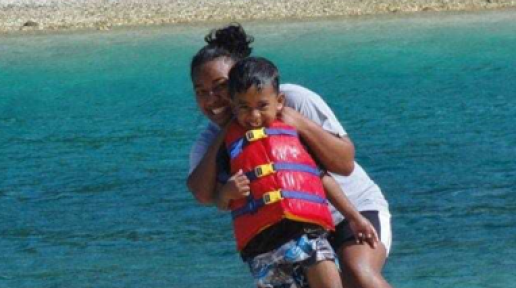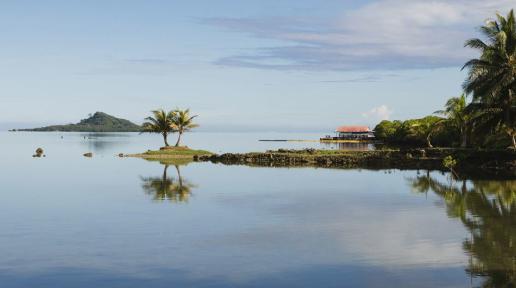Story
26 November 2025
UN@80 Youth Celebration Unites Over 300 Students in Pohnpei, FSM
The morning sun cast long, warm rays across the palm trees surrounding the Pohnpei State Gym as more than 300 students from high schools across Pohnpei made their way onto the grounds. Under the shade of the towering coconut trees and the hum of excitement in the air, young people gathered to celebrate 80 years of the United Nations. This is a milestone that has shaped both global history and the story of the Federated States of Micronesia itself. The Pohnpei State Gym, nestled among lush greenery and at the heart of Pohnpei’s education community, became a vibrant meeting place for learning, sports, and youth leadership. The UN@80 Youth Celebration, organized in partnership with the Pohnpei State Department of Education, Pohnpei Health and Social Affairs, the Government of FSM, and the UN Resident Coordinator’s Office Micronesia, placed the voices and experiences of young people at the center of this historic anniversary. Guiding the day’s programme were two young Micronesian UN Volunteers, Adelina Wichep, 22, and AJ Gilmete, 23, who brought an energetic and relatable perspective to the event’s discussions and activities. "The future of Micronesia calls for the voices of its youth. Your voices and visions will shape the course of our islands tomorrow." Said Adelina Wichep.UN@80: What the Anniversary Means for Micronesia and the WorldAs the world celebrates 80 years of the United Nations, the UN in Micronesia joins communities across the Pacific in marking this global milestone that honours a living promise of peace, dignity, and equality for all peoples.The celebration in FSM opened with remarks from Mr. Stanley Etse, Director of Education, Pohnpei State, and Mr. Cromwell Bacareza, Chief of the UNICEF North Pacific Field Office. Mr. Bacareza reflected on the significance of the UN’s 80th anniversary.For the Federated States of Micronesia, Kiribati, Marshall Islands, Nauru, and Palau, the anniversary resonates deeply. From the period of the United Nations Trusteeship to present-day nation-building, the UN has supported Pacific Island communities through transitions of sovereignty, development planning, and international advocacy. “Here in the Federated States of Micronesia, this anniversary holds special meaning. The UN has stood with the people of these islands through independence, development, and regional cooperation. Today, our partnership is stronger than ever and centered on those who shape the future of this nation: children and young people”, said Cromwell Bacareza, Chief of the UNICEF North Pacific Field Office.He noted that this milestone is not only about honoring the past, but also about strengthening the commitment to ensuring that every young person has the opportunity to learn, lead, and thrive.Across the region, the UN continues to work with governments, civil society, youth, and development partners to accelerate progress toward the Sustainable Development Goals. This includes strengthening health and education systems, promoting gender equality, advancing disability inclusion, expanding access to renewable energy, and supporting climate resilience in communities at the frontlines of global change.Interactive Learning and Youth EngagementThroughout the morning, the PICS Gym transformed into a hub of activity as students visited interactive booths hosted by IOM, UNICEF, UNDP, UNFPA, UNOPS, and UNV. Each booth showcased programmes that directly shape the lives of young people in the FSM, where the UN system supports:• Quality education, including digital skills• Health and nutrition, including adolescent wellbeing• Gender equality and ending violence against women and girls• Climate resilience, empowering young people to protect their islands• Inclusion of persons with disabilities in all areas of life• Youth leadership and participation in decision-makingDuring the event, students were encouraged to ask questions, learn from UN staff, and explore the breadth of opportunities available to them.“I liked the event because after the speeches, we were able to visit all of the UN stalls and learn about the important programs they are doing in Micronesia to support young people, as well as our planet and our collective future” Said JR, 17, one of the students that participated in the event.Sports, Wellness, and Inclusion The day also included a series of sports activities, basketball games, capoeira demonstrations, and darts sessions, highlighting the role of physical activity in promoting teamwork, discipline, and inclusion. Between games, students enjoyed healthy meals prepared to emphasize the importance of nutrition and wellbeing in everyday life.These activities brought together students from different schools, backgrounds, and abilities, reinforcing the event’s message that inclusion is not just an idea, but a practice embedded in community life. "Every generation surpasses the last in building a shared future. That’s the power of youth. This is why the UN’s support is so important." Said AJ Gilimete, a UN Volunteer and Micronesian Youth.Diplomatic and Community SupportRepresentatives from the diplomatic missions of Australia, China, and the United States joined the event, standing alongside local leaders and educators in support of FSM’s youth. Their participation reflected the strong partnerships that strengthen the UN’s work across the North Pacific. “When we work together, we strengthen opportunities for Micronesian youth and ensure no one is left behind - it was heartwarming to see the kids engaging with the displays. Moments like these remind us that the ability to create lasting change begins with the young,” said Sarah McCarthy, Deputy Head of Mission, Australian Embassy in FSM.A Shared Commitment to the FutureAs the United Nations turns 80, it reaffirms its commitment to working side by side with all five Micronesian countries to build resilient, inclusive, and sustainable societies. Whether through climate resilience programs, gender equality initiatives, expanded education and health services, or enhanced youth participation, the UN will continue to support national and community priorities across the region.The UN@80 Youth Celebration embodied this commitment: a day where young people learned, connected, envisioned their future, and shared their pride as the next generation of Micronesian leaders. Cromwell Bacareza, Chief of the UNICEF North Pacific Field Office reflected:“If the last 80 years have taught us anything, global progress depends on the strength and vision of young people.As we look to the next decades of the UN, one truth is clear:
You are the future of FSM.You are the future of Micronesia.
You are the future of our world.
And you are the future of the United Nations.”The youth of Micronesia that participated at the event also had a powerful message for global leaders. Rodrick, 16 advocated:
“Global leaders should continue supporting the UN because it will change the future of Micronesian and global youths. We can't build this sustainable future alone. Together, we can be bold and create lasting change.”
You are the future of FSM.You are the future of Micronesia.
You are the future of our world.
And you are the future of the United Nations.”The youth of Micronesia that participated at the event also had a powerful message for global leaders. Rodrick, 16 advocated:
“Global leaders should continue supporting the UN because it will change the future of Micronesian and global youths. We can't build this sustainable future alone. Together, we can be bold and create lasting change.”














